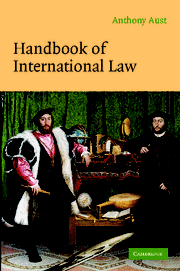Book contents
- Frontmatter
- Contents
- Foreword
- Preface
- Acknowledgments
- Table of treaties
- Table of MOUs
- Table of cases
- Glossary of legal terms
- List of abbreviations
- 1 International law
- 2 States and recognition
- 3 Territory
- 4 Jurisdiction
- 5 The law of treaties
- 6 Diplomatic privileges and immunities
- 7 State immunity
- 8 Nationality, aliens and refugees
- 9 International organisations
- 10 The United Nations, including the use of force
- 11 Human rights
- 12 The law of armed conflict (international humanitarian law)
- 13 International criminal law
- 14 Terrorism
- 15 The law of the sea
- 16 International environmental law
- 17 International civil aviation
- 18 Special regimes
- 19 International economic law
- 20 Succession of states
- 21 State responsibility
- 22 Settlement of disputes
- 23 The European Union
- Index
9 - International organisations
Published online by Cambridge University Press: 05 August 2012
- Frontmatter
- Contents
- Foreword
- Preface
- Acknowledgments
- Table of treaties
- Table of MOUs
- Table of cases
- Glossary of legal terms
- List of abbreviations
- 1 International law
- 2 States and recognition
- 3 Territory
- 4 Jurisdiction
- 5 The law of treaties
- 6 Diplomatic privileges and immunities
- 7 State immunity
- 8 Nationality, aliens and refugees
- 9 International organisations
- 10 The United Nations, including the use of force
- 11 Human rights
- 12 The law of armed conflict (international humanitarian law)
- 13 International criminal law
- 14 Terrorism
- 15 The law of the sea
- 16 International environmental law
- 17 International civil aviation
- 18 Special regimes
- 19 International economic law
- 20 Succession of states
- 21 State responsibility
- 22 Settlement of disputes
- 23 The European Union
- Index
Summary
I don't want to belong to any club that will accept me as a member.
Schermers and Blokker, International Institutional Law, 4th edn, Leiden, 1995
Klabbers, An Introduction to International Institutions, Cambridge, 2002
Sands and Klein (eds.), Bowett's Law of International Institutions, 5th edn, London, 2001
Shaw, International Law, 5th edn, Cambridge, 2003, pp. 1161–215
International organisations grew out of the diplomatic conferences of the nineteenth century as states sought more effective ways to deal with problems caused by the rapid development of international society. The International Telegraphic (later Telecommunications) Union and the Universal Postal Union were founded in the 1860s. There are now countless international organisations, ranging from large ones with global responsibilities and virtually universal membership, such as the United Nations and the UN specialised agencies, to regional or highly specialised organisations, such as the (large) European Union and the (tiny) International Whaling Commission. Although each organisation is different and must be studied separately, they share the following basic characteristics:
Establishment by treaty (constituent treaty), although there are some exceptions. The Organization for (previously Conference on) Security and Co-operation in Europe (OSCE/CSCE), emerged following the Helsinki Final Act 1975, which was not a treaty. Nor was the Commonwealth or its secretariat established by treaty. The International Committee of the Red Cross (ICRC) is a Swiss corporation, and states are not members of it. However, it has a special place internationally, being regarded with particular respect by governments and referred to in (and sometimes a party to) treaties.
Membership limited exclusively or primarily to states. This is reflected in the alternative generic term ‘intergovernmental organisation’. […]
- Type
- Chapter
- Information
- Handbook of International Law , pp. 196 - 204Publisher: Cambridge University PressPrint publication year: 2005



